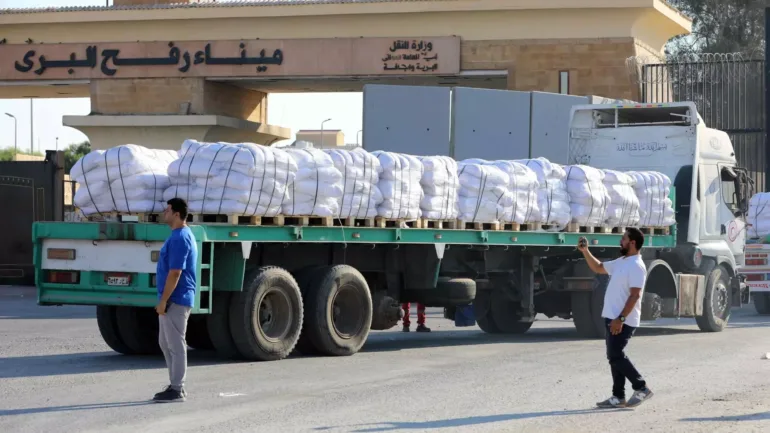Israel declared a “tactical pause” in military operations in parts of the Gaza Strip on Sunday, saying the move aims to facilitate the delivery of humanitarian aid and avert a worsening hunger crisis.
According to the Israeli military, the pause will apply daily from 10:00 a.m. to 8:00 p.m. (0700 to 1700 GMT) in areas where Israeli forces are not currently active, including Al-Mawasi, Deir el-Balah, and Gaza City. The military also announced it had opened “designated secure routes” across Gaza to allow United Nations and humanitarian convoys to safely distribute food and medicine.
In a statement, the Israel Defense Forces (IDF) said the pause was coordinated with the UN and international organizations to “increase the scale of humanitarian aid entering the Gaza Strip.” The military also began air-dropping food supplies into Gaza and forcefully rejected accusations that it was using starvation as a weapon of war.
“There is no deliberate starvation campaign,” the IDF said, insisting that the ongoing humanitarian operations prove claims of enforced famine are false.
However, aid organizations were cautious in their response. The UN and other humanitarian groups offered no immediate public reaction, and some privately expressed skepticism, saying they would wait to assess the impact of Israel’s announcement on the ground.
Air drops and rising death toll
On Saturday, before Israel’s airborne drop of seven food pallets, the United Arab Emirates announced it would resume aid drops, while Britain pledged to coordinate similar efforts with Jordan. UK Prime Minister Keir Starmer publicly backed the move, despite widespread doubts over the effectiveness of air drops in addressing large-scale hunger.
“Air drops will not reverse the deepening starvation,” warned Philippe Lazzarini, head of the UN’s agency for Palestinian refugees (UNRWA). “They are expensive, inefficient, and can even kill starving civilians.”
Humanitarian agencies continue to criticize Israel for tightly controlling land access and restricting aid movement within Gaza. Although Israel maintains it does not limit the number of aid trucks entering the enclave, it has accused UN and relief groups of failing to collect and distribute supplies efficiently. Humanitarian groups strongly dispute this, citing security restrictions and logistical barriers imposed by Israeli forces.
Since the start of the year, over 100 NGOs have sounded the alarm about the spread of mass starvation in Gaza. The humanitarian situation has sharply deteriorated since Israel imposed a total blockade on March 2, following the collapse of ceasefire negotiations. Only a limited flow of aid has resumed since late May.
Meanwhile, the Palestinian civil defense agency reported more than 50 deaths on Saturday alone, with many victims struck near aid distribution points. Among them were civilians who had gathered in the hope of receiving food.
“We ask God and our Arab brothers to work harder to reach a ceasefire before we all die,” said Gaza resident Hossam Sobh, who described narrowly escaping death while retrieving a bag of flour near an Israeli tank.
Naval blockade and activist arrests
Also on Saturday, Israeli troops intercepted and boarded a boat belonging to the pro-Palestinian Freedom Flotilla Coalition as it attempted to breach the naval blockade of Gaza. The vessel, the Handala, had broadcast a live feed until it was cut moments after the Israeli military took control of the ship.
A separate aid initiative, the Israeli- and U.S.-backed Gaza Humanitarian Foundation, is also underway. However, it has faced harsh international criticism, particularly after Israeli forces killed hundreds of Palestinians near aid distribution zones.
Due to media restrictions and limited access in Gaza, AFP has been unable to independently verify the full casualty figures or many on-the-ground details provided by either side.
Israel launched its military campaign in Gaza following Hamas’s October 2023 attack, which killed 1,219 people—mostly civilians—according to an AFP tally based on official Israeli figures.
Since then, the death toll in Gaza has risen to 59,733, mostly civilians, according to the health ministry in the Hamas-run territory.
AFP


